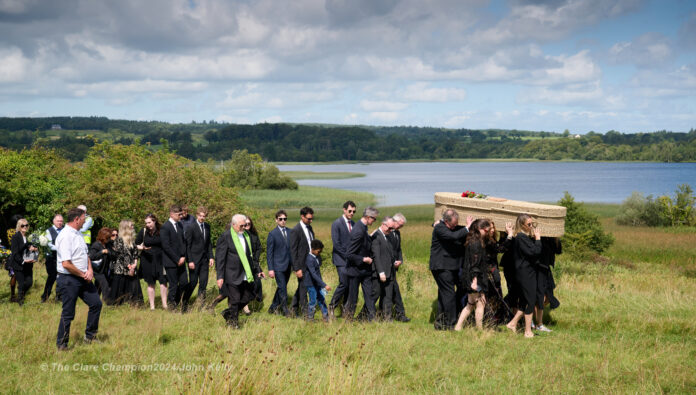Tuamgraney’s internationally acclaimed novelist Edna O’Brien has been buried in Holy Island in keeping with a request she made to her family years ago.
In the region of 150 mourners were ferried from Knockphort, Mountshannon to this picturesque monastic site by numerous boats with assistance from Clare Civil Defence volunteers and under the watchful eye of the Killaloe Coast Guard and the RNLI.
Chief Celebrant Fr Donagh O’Meara described Ms O’Brien as an “extraordinary woman” and “speaker of truth” who held up a mirror to Irish society during her Funeral Mass in St Joseph’s Church, Tuamgraney on Saturday.
“We didn’t thank her for it. Like a lot of prophetesses of the past, we undermined her, we isolated her and rejected her message and she must have deeply felt that,” he admitted in reference to the fact that her debut novel Country Girls was banned and burned in East Clare in 1960.
He noted that it must have been difficult to “stand out” like she did, for bringing important issues to light, which in turn resulted in isolation.
“When you stand out at any moment, at any time, you find yourself isolated quite quickly. And we did that. And that is to our shame as a society and as a church. That is to our shame.
The internationally acclaimed East Clare writer, who died in London at the age of 93 after a long illness, was the author of more than 30 literary works.
Her Funeral Mass was attended by President Michael D Higgins and his wife Sabina, Clare County Council Chief Executive Officer, Pat Dowling, council chairman, Alan O’Callaghan, Senator Timmy Dooley, and Councillor Pat Burke, with Commandant Claire Mortimer representing both the Taoiseach and Tánaiste.
Her son, Marcus Gébler, said he has been “moved and overwhelmed” by the tributes paid to his mother since her passing “from so many different people in so many countries”.
He told the congregation he believed that the purpose of her writing “has been and will remain, to illuminate, inspire, give courage to and speak for those who are rendered dumb”.
He read a short poem, written for his mother’s birthday, dedicated to “the original Country Girl” about “the journey of an epic life”.
Ms O’Brien’s youngest grandchild Oscar brought her French Legion of Honour to the altar as a symbol of her “lifetime of extraordinary achievements”, including her damehood and her election as Saoi of Aosdána.
Symbols of her life including flowers from her childhood home, a small Buddha statue, a copy of Ulysses by James Joyce and a portrait of Samuel Beckett were also brought to the altar.
Novelist, Andrew O’Hagan described Ms O’Brien as a “comic engine” who possessed a talent “so singular, that nothing could countermand it – not age, not illness or lack of stamina”.
“She lived inside her prose like no writer I have ever known. Every character she invented was an aspect of her own heart”.
“From her first model to her last, Edna took a stand for free expression that the whole world might be thankful for.”
Mr O’Hagan said that her “revolutionary intervention” in Irish fiction has been much discussed since her passing, but “the hard road she had to navigate” must also be remembered.
“In a beautiful pub, not five minutes from here, there’s a framed photograph of 12 of the great geniuses of Irish literature – 12 men. Anyone who has any doubt about the importance of Edna O’Brien should keep that picture in mind.”
He remembered her as a “star” in an industry that did not quite know how to handle stars, and yet she had the “courage to live as an artist” who “lived at the summit of her imagination”.
“Edna combines social elegance with the loneliness of the long distance runner and will remain as long as there are readers, as long as there is wonder, as long as an Ireland and human beings are longing for progress, there will be an Edna O’Brien and a glow around her memory.”
Dan Danaher
East Clare correspondent, Dan Danaher is a journalism graduate of Rathmines and UL. He has won numerous awards for special investigations on health, justice, environment, and reports on news, agriculture, disability, mental health and community.
















